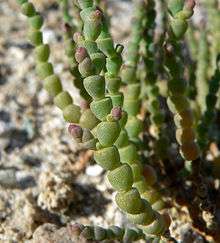Allenrolfea occidentalis
Allenrolfea occidentalis, the iodine bush, is a low-lying shrub of the Southwestern United States, California, Idaho, and northern Mexico.[2]
| Iodinebush | |
|---|---|
 | |
| Scientific classification | |
| Kingdom: | Plantae |
| Clade: | Tracheophytes |
| Clade: | Angiosperms |
| Clade: | Eudicots |
| Order: | Caryophyllales |
| Family: | Amaranthaceae |
| Genus: | Allenrolfea |
| Species: | A. occidentalis |
| Binomial name | |
| Allenrolfea occidentalis (S.Wats.) Kuntze | |
| Synonyms[1] | |
| |
It grows in sandy, often salty, distinctly alkaline soils, such as desert washes and saline dry lakebeds. It is a common halophyte member of the alkali flat ecosystem.[2]
Description
The knobby green stems are fleshy and appear jointed at the internodes between segments. Often the segments are so short they are nearly round. The leaves appear as flaky scales scattered across the surface of the stems. The genus was named for the English botanist Robert Allen Rolfe.[3]
The seeds of iodinebush have been used as food in North America in prehistory.[4]
gollark: At least here.
gollark: Mostly it just teaches you processes and occasionally slight improvisation capability.
gollark: School maths isn't that great at teaching "logical thinking" though.
gollark: The UK has a somewhat similar system (but you pick subjects for the "liceum"), except the technical schooling side is low-status for some reason.
gollark: Its actual real purpose is daycare and conformity.
References
- "The Plant List: A Working List of All Plant Species".
- Shultz, L.M.: 'eFloras 2008. Allenrolfea occidentalis in Flora of North America. Missouri Botanical Garden, St. Louis, MO & Harvard University Herbaria, Cambridge, MA.
- Shultz, L.M.: 'eFloras 2008. Allenrolfea in Flora of North America. Missouri Botanical Garden, St. Louis, MO & Harvard University Herbaria, Cambridge, MA.
- Rhode, David; Madsen, David B.; Jones, Kevin T. (2006) Antiquity of early Holocene small-seed consumption and processing at Danger Cave Archived 2012-07-07 at Archive.today Antiquity 80(308):328-339
Further reading
- Gul, B., D. J. Weber, and M. A. Khan. (2001). Growth, ionic and osmotic relations of an Allenrolfea occidentalis population in an inland salt playa of the Great Basin Desert. Journal of Arid Environments 48(4) 445–60.
External links
| Wikimedia Commons has media related to Allenrolfea occidentalis. |
| Wikispecies has information related to Allenrolfea occidentalis |
This article is issued from Wikipedia. The text is licensed under Creative Commons - Attribution - Sharealike. Additional terms may apply for the media files.